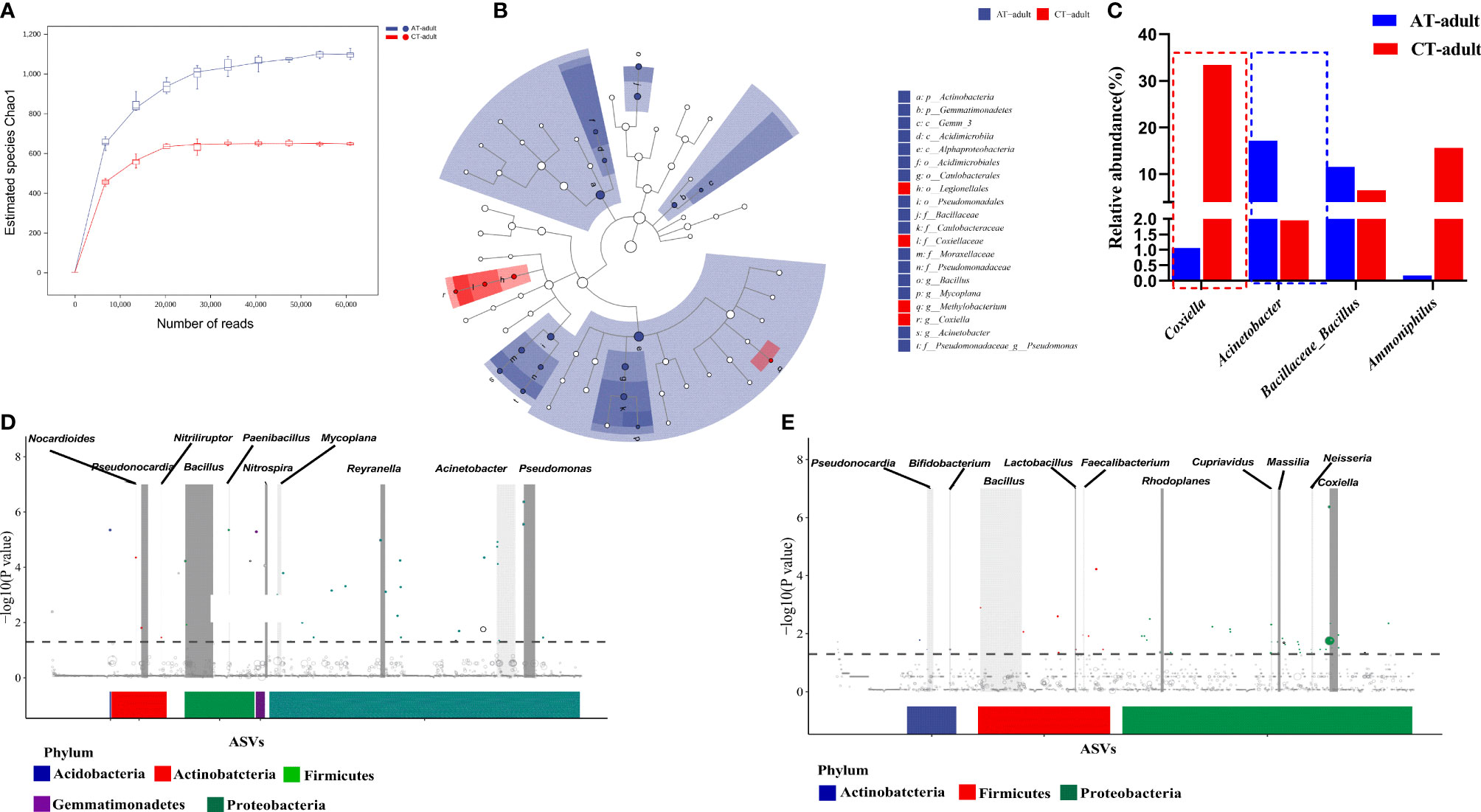
95% of researchers rate our articles as excellent or good
Learn more about the work of our research integrity team to safeguard the quality of each article we publish.
Find out more
CORRECTION article
Front. Cell. Infect. Microbiol. , 27 September 2021
Sec. Parasite and Host
Volume 11 - 2021 | https://doi.org/10.3389/fcimb.2021.765387
This article is a correction to:
The Tick Microbiota Dysbiosis Promote Tick-Borne Pathogen Transstadial Transmission in a Babesia microti–Infected Mouse Model
A Corrigendum on
The Tick Microbiota Dysbiosis Promote Tick-Borne Pathogen Transstadial Transmission in a Babesia microti Infected Mouse Model
By Wei N, Cao J, Zhang H, Zhou Y and Zhou J (2021). Front. Cell. Infect. Microbiol. 11:713466. doi: 10.3389/fcimb.2021.713466
In the original article, there was a mistake in the legend for Figure 2 as published. OTUs should be changed to ASVs. The correct legend appears below.

Figure 2 Antibiotics used on mice resulted in tick microbiota dysbiosis. (A) Rarefaction curve of the estimated number of genera using the Chao1 method. (B) Cladogram for taxonomic representation of significant differences between two groups. (C) Percentages of the most abundant genera in AT adults and CT adults. (D, E) Manhattan plots showing the abundance enrichment in the AT adults (D) and CT adults (E). The dashed line represents the P = 0.05 threshold of significance.The color represents the different taxonomic affiliation of the ASVs (phylum level), and the dot size corresponds to their relative abundance in the respective samples. Gray boxes denote the different taxonomic groups (genus level).
“The color represents the different taxonomic affiliation of the ASVs (phylum level), and the dot size corresponds to their relative abundance in the respective samples.”
The authors apologize for this error and state that this does not change the scientific conclusions of the article in any way. The original article has been updated.
In the original article, there was a mistake in Figure 2 as published. OUTs should be changed to ASVs. The corrected Figure 2 appears below.
The authors apologize for this error and state that this does not change the scientific conclusions of the article in any way. The original article has been updated.
In the original article, there was a mistake in Supplementary Material as published. Supplement Table S3 in the Data sheet 1 showed wrong (showed repeat with Table S1 due to a typographical error). The corrected Supplement Table S3 appears below.
The authors apologize for this error and state that this does not change the scientific conclusions of the article in any way. The original article has been updated.
All claims expressed in this article are solely those of the authors and do not necessarily represent those of their affiliated organizations, or those of the publisher, the editors and the reviewers. Any product that may be evaluated in this article, or claim that may be made by its manufacturer, is not guaranteed or endorsed by the publisher.
The Supplementary Material for this article can be found online at: https://www.frontiersin.org/articles/10.3389/fcimb.2021.765387/full#supplementary-material
Keywords: Haemaphysalis longicornis, microbiota dysbiosis, antibiotic usage, Babesia microti, peritrophic matrix
Citation: Wei N, Cao J, Zhang H, Zhou Y and Zhou J (2021) Corrigendum: The Tick Microbiota Dysbiosis Promote Tick-Borne Pathogen Transstadial Transmission in a Babesia microti Infected Mouse Model. Front. Cell. Infect. Microbiol. 11:765387. doi: 10.3389/fcimb.2021.765387
Received: 27 August 2021; Accepted: 13 September 2021;
Published: 27 September 2021.
Edited and reviewed by:
Julius Lukes, Academy of Sciences of the Czech Republic (ASCR), CzechiaCopyright © 2021 Wei, Cao, Zhang, Zhou and Zhou. This is an open-access article distributed under the terms of the Creative Commons Attribution License (CC BY). The use, distribution or reproduction in other forums is permitted, provided the original author(s) and the copyright owner(s) are credited and that the original publication in this journal is cited, in accordance with accepted academic practice. No use, distribution or reproduction is permitted which does not comply with these terms.
*Correspondence: Jinlin Zhou, amlubGluemhvdUBzaHZyaS5hYy5jbg==
Disclaimer: All claims expressed in this article are solely those of the authors and do not necessarily represent those of their affiliated organizations, or those of the publisher, the editors and the reviewers. Any product that may be evaluated in this article or claim that may be made by its manufacturer is not guaranteed or endorsed by the publisher.
Research integrity at Frontiers

Learn more about the work of our research integrity team to safeguard the quality of each article we publish.